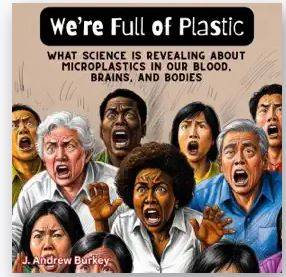There is the growing evidence that humans are contaminated with plastic, especially in the form of microplastics and nanoplastics. Microplastics are plastic particles smaller than 5 mm. Nanoplastics are even smaller, less than 100 nanometers across. These particles come from degraded packaging, textiles, and plastic products, Food and water contaminated with plastic and Inhalation of airborne plastic particles.
Microplastics
have been detected in human blood, indicating they can circulate through the
body. Airborne plastics can be inhaled and found embedded in lung tissue.
Studies have found microplastics in the placentas of pregnant women. Some
studies have detected microplastics in breast milk samples. Multiple studies
have confirmed the presence of plastics in human waste. Author J. Andrew Burkey’s
book “We are full of plastics” reveal that every day the average person
consumes invisible particles of plastic up to 5g each week, this is the
equivalent size of a credit card. Our brain, blood and even the placenta of
unborn children are not left out in the exposure to accumulating trace amounts
of plastic from the environment.
The average human being is at risk of
Inflammation and oxidative stress from plastic particles, Toxic additives in
plastics like BPA or phthalates, which are hormone disruptors. In the book “the
problem with plastics” Author Judith Enck, Adam Mahoney and Beyond
Plastics discusses the environmental and public health impacts of plastics. The
book connects plastic pollution with global warming, poisoned oceans and more. The
urgency to track and control this trend through policy and legislative
processes is well elucidated.
The global plastic treaty is
envisioned as a legally binding international agreement to tackle plastic
pollution across its entire life cycle, from design and production to
disposal. UN Environment Assembly in March 2022, tasking an Intergovernmental
Negotiating Committee (INC) to finalize it by end of 2024 and formally adopt in
2025. The implications of the signing of this treaty for Nigeria and Ghana
include reduced plastic leakage into oceans, rivers, and cities, especially
crucial for Lagos and Accra, where plastic pollution clogs
drainage and floods communities. Cleaner air and soil, as open burning of
plastic waste declines. Better health outcomes due to reduced microplastic
exposure and fewer toxic emissions. In the book “The fragile Planet” Author Davis
Truman, asserts the guaranteed possibility of reducing waste to the barest
minimum in our daily life. The well researched book pilots’ readers to
sustainable ways of curbing climate change and pollution.
Can Africans live without Plastics?
Ghana consumes over 1.1 million tonnes of
plastic annually, with most of it used for the short-lived items like
packaging. In 2017, per-person plastic usage rose from 5.7 kg to 7.4 kg, reflecting growing dependence. Nigeria remains
the largest importer of plastic resin in West Africa, supplying many local
production lines. In 2024, Nigeria produced around 1.2 million tonnes of
plastic sacks and bags, the highest in Africa.
The treaty may limit virgin plastic production and imports, affecting: Plastic manufacturers and Packaging-dependent industries. Potential job losses and increased compliance costs for businesses. No African country has formally accepted the global plastics treaty yet. The treaty is still under negotiation, and formal acceptance or signing hasn’t occurred for any nation, African or otherwise. For closely related reasons, The U.S. has firmly opposed binding limits or restrictions on plastic production.
Can every household in Africa copy from Isatou Ceesay in the Gambia, whose story is narrated by Author Miranda Paul. She recycles bags to transform her community.
Get these Books and Media from the Apple Book Store,
Follow Links:
Enck, J. and Mahoney, A. [2025] The Problem with
Plastic. Link: https://apple.co/4msUXG3
Burkey, A. J.
[2025] We’re Full of Plastic: What Science Is Revealing About Microplastics in
Our Blood, Brains, and Bodies (Unabridged)
Link: https://apple.co/41u3Fvt
Truman, D. [2025]. The Fragile Planet: Zero Waste
Strategies in The Fight Against Climate Change and Pollution
Link: https://apple.co/4oje1Im
Breakfast Wrap: Will plastic pollution treaty talks go
far enough?
Radio National Breakfast Podcast Episode ∙ Daily News ∙ 2025
∙ 25 minutes
Link: https://apple.co/4omNxG1
Microplastics Pollution and Worldwide Policies on Plastic
Use
Book ∙ Engineering ∙ 2024
Link: https://apple.co/4oAh8Mq
The stream of plastic pollution: could a global treaty
help us turn off the tap?
Science Weekly Podcast Episode ∙ Science ∙ 2024 ∙ 15
minutes, 56 seconds
Link: https://apple.co/4lgfVXN
Miranda, P. [2020]. One Plastic Bag: Isatou Ceesay and
the Recycling Women of the Gambia
Link: https://apple.co/45637yo


